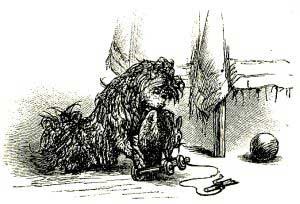 полная версия
полная версияHarper's Young People, November 11, 1879
It was curious to see a dog perpetually rushing at cats, and then returning from the chase to gambol about in the most friendly manner with another cat. The friendly intercourse with the one never had the slightest effect in changing its animosity to others. The dog's affection even went so far as to cause it to show resentment whenever the cat was punished. When the cat was touched with the whip, it would turn up its eyes, and look as much annoyed as it was possible for a dog to be. Animals have keener susceptibilities, and show more feeling, than many people imagine.
Sea-gulls are not often met with as domestic pets; but the great bird-fancier Morris, in his work on natural history, mentions a tame sea-gull which struck up a great friendship with a terrier which spent a great part of its time in the garden where the gull was kept. Here is an anecdote contributed some years ago to the Naturalist, on the authority of Mr. Donaldson. His gull was quite an epicure in its way, and fancied sparrows' flesh for dinner. But as it had to cater for its own luxuries, the question of catching the sparrows became an important one. However, the gull thought the matter over, and soon devised an excellent scheme for capturing the four or five sparrows which it required as a daily bonne bouche. It fraternized with a number of pigeons which were fed in the yard where the gull was kept. The crafty bird had made a note of the fact that several sparrows always came down at feeding-time to get some of the food spread for the pigeons. "By getting among the pigeons, and keeping my head down," reasoned the gull, "I shall get close enough to catch some of these nice little fellows easily."
And this is how the gull made use of its friends the pigeons. It went among them, and, by stooping, avoided detection. Then, to use the words of the eye-witness, the gull "set at a sparrow as a pointer dog would do at its game." In an instant it had the luckless victim by the back, and swallowed it without giving it time to shut its eyes. But this was an unlovely friendship. The motives were altogether mercenary and low. The story affords, however, a curious instance of the power of reasoning possessed by some animals.
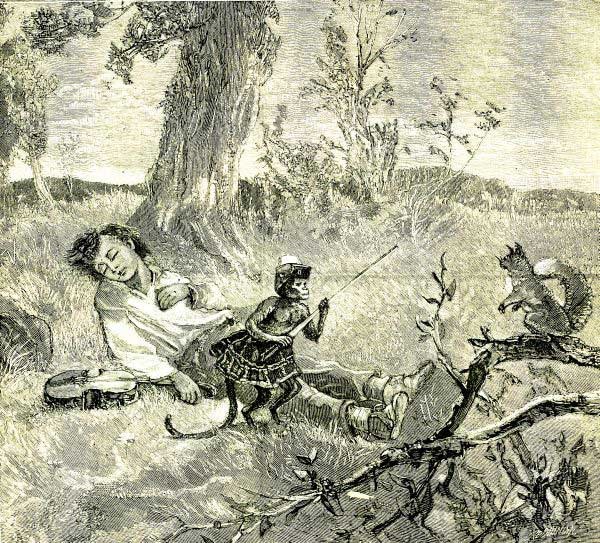
ON GUARD.—Drawn by Sol Eytinge, Jun.
ON GUARD
Halt! Not a step farther! Don't move for your life!You're a very nice squirrel, I haven't a doubt(Although you've forgotten, I see, to put onYour kilt and your jacket before you came out),But where you now are you must stop for an hourOr two, and quite silent meanwhile you must keep,For a weary long way we have travelled to-day,And my dear little master lies there fast asleep.Of course you don't know—you've grown up in the woods,With no one to teach you—how fine 'tis to beGreat artists as we are! You've heard but the birds,And seen only squirrels jump round in a tree.My master the sweetest of music can make(Sh! you rustled a leaf—he half-opened his eyes),And a gun I can handle, a drum I can beat,And I dance like a fairy—I tell you no lies.My dear little master! full oft he has shared,Bite for bite, with me, squirrel, his very last crust,And he's patiently carried me many a mile,And that now I guard him I am sure is but just.Curl your tail up still tighter, and don't let it fallLest a noise it should make—it's remarkably big—And, if you are good, by-and-by we may allHave a right merry tune and a right merry jig.THE LITTLE GENIUS
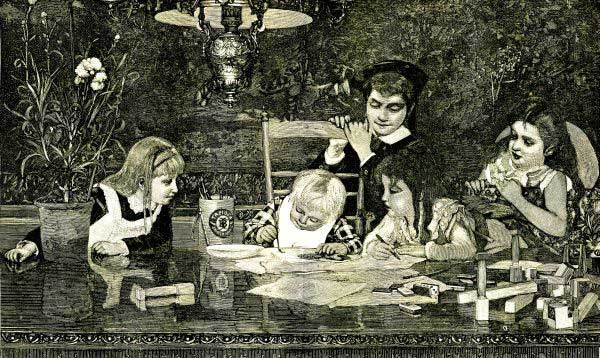
THE LITTLE GENIUS.
Little five-year-old Bertie was very fond of sitting at the study table with his brothers and sisters, especially when they were doing their drawing lessons. But he was not satisfied with watching them. He too wanted to draw and paint, and the older children, who were very fond of him, were always glad to indulge him by lending him their brushes, paints, and pencils. But they soon found that he was very wasteful of their materials, and would use up colors and paper faster than they could be supplied. At last they thought of a better plan. As Bertie was too young to draw nicely, they bought him some wonderful picture-books, all in outline, a box of cheap water-colors, and some brushes. Then Bertie was happy. He would sit for hours painting the pictures in Jack the Giant-killer, Mother Goose, and other story-books for little folks. When he had finished all his little books his mamma brought out some old papers which she had saved, and cutting out the nice pictures, gave them to him to paint. This he did very beautifully. Sometimes he would make funny mistakes, putting green on the horses, and blue on the little dogs and pussy-cats, but this did not happen often. In a little while he had so many nice things painted that his sisters made him a big scrap-book to keep them in, to look at when he grows up.
Bertie may not become a great artist, but his sisters evidently regard him as a little genius.
THE FLOWER THAT GREW IN A CELLAR
It was the evening of flower-day in the Child's Hospital, and the kind ladies of the Flower Mission had brought many lovely posies to gladden the eyes and the hearts of the sick children, and the whole place was bright with their beauty and sweet with their fragrance. Queenly roses, gay gladioluses, pure white lilies, bunches of star-like daisies and their soft round white little buds, gaudy marigolds, brown, yellow, and orange, crimson cock's-combs, branches of honeysuckle vines filled with honey, rich fairy trumpets, saucy elf-faced pansies, spicy pinks, hollyhocks in satiny dresses of many colors, bright-eyed verbenas and sweet-williams, brilliant geranium blossoms, and even great honest faithful sunflowers—those flowers that love the sun so dearly that they turn to gaze upon him when he is bidding the earth "good-night"—were all there, bringing with them Love and Hope and a troop of gentle spirits.
All day had the sick and maimed little ones rejoiced in their presence; and now when they were placed in the wee pitchers and vases that stood on the shelves above each snow-white little bed, and the sunshine faded, and the stars came out, their loveliness and fragrance floated into the dreams of the sleeping children. The dreams of all but one, I should say; for one dear little girl, with great gray eyes and tangled brown curls, who had fallen and hurt her back so badly a few days before that it was feared she would never walk again, was wide-awake, trying hard to keep back the tears that filled her eyes and the sobs that rose in her throat when she thought of the dear father and mother and the darling baby brother she had left in the poor home from which she had been brought. A small lamp hung from the ceiling near by, and cast a faint light upon the flowers that were crowded into a quaint jug on the shelf above her bed. There were some roses, some lilies, some daisies, and one very pale pink geranium blossom in the midst of a group of pretty shy buds; and as the little girl stifled a great sob that seemed determined to break out, she became conscious of several very small voices whispering softly together; and listening intently for a few moments, she discovered these voices came from the flowers in the quaint jug.
"I came," said a lovely crimson rose, when the whispering had ceased, and the flowers were apparently satisfied that the children were all asleep, "from a most beautiful garden, where birds sing and fountains play all day long, and the rarest of our race are tended with the greatest love and care."
"I came," said a daisy, "from a happy meadow, where the bees and butterflies roam from morning till night, where thousands and thousands of my sisters look up and smile at the bright blue sky, and the cheery green grass nods—on every side."
"I came," said a stately water-lily, "from a great lake, where the waves flash like precious gems in the day, and like purest silver at night, where glancing fish swim merrily to and fro, where tall, graceful, drooping trees standing upon the mossy banks cast their shadows upon the water, where, when the air begins to tremble with the earliest songs of the birds, the broad, faint light of morn steals from sleeping lily to sleeping lily, and wakes them with a touch."
"I came," said the pale pink geranium blossom, "from a cellar."
"A cellar!" repeated the others, moving a little away from her.
"Yes, a cellar."
"I never met a flower from a cellar before," said the rose.
"Nor I," said the daisy.
"Nor I," said the lily. "There are no cellars in lakes."
"I thought they were all cellar," said the daisy, slyly; but the lily made no reply.
"Would you mind telling us how you came there?" asked the rose. "Being full-blown, I couldn't sleep much, if I tried."
"I am perfectly willing to tell you, if the others care to listen," said the pink flower, modestly.
"Pray go on," begged the daisy.
And "I have no objection," added the water-lily, in a gracious manner.
"One day," began the geranium blossom, growing a little pinker as its companions all turned toward it, "a servant-maid tossed from a window a withered bouquet into the street, and in the centre of this bouquet was a slip of geranium which had been placed there because its crumpled young leaves were so fresh and green. A poor little girl passing by picked up this slip, and carried it to a wretched cellar, where she lived in the greatest untidiness with her mother—a poor, weak, complaining woman—and her two small sisters and eight-year-old brother. Here she found a battered tin pail, which she filled with dirt from the street, and in this dirt she planted the slip of geranium. 'See, mommy,' she said, holding it up, as her mother raised her eyes from the coarse garment she was making, 'I mean to take awful good care of this, and some day it may grow a flower, a beautiful flower, like those I see in the windows of the big houses. Wouldn't that be lovely, mommy?' And she climbed up on the shaky old wooden table, and placed the pail on the ledge of the four-paned cellar window.
"But the window-panes were so covered with cobwebs and dirt that the little of the blessed sunlight that found its way down there could not get in at all. So Polly got the broom, and carefully swept away the dust and the spider-webs, and then she washed and polished the four panes until they shone again, and the very next afternoon a sunbeam came to visit the geranium, and a tiny new leaf peeped out to greet it. When the window was cleaned, the shelf (holding a few old tin pans) that hung below it looked so dingy that Polly could not rest until she had scrubbed it well. Nor did she stop there, but also scoured the old tin things before she put them back in their places, until they almost looked like new. And thus, from the very moment of my mother-plant's arrival there, a change for the better began in that dreary cellar. It seemed so natural, when Polly had the basin of water ready to sprinkle the geranium, to wash the faces and hands of her little sisters and brother first; and then, of course, the room must be swept and put in order, so that the bright clean faces might not seem out of place in it. And when at last a cluster of wee pink buds crowned the green stem, Polly's joy knew no bounds. Her poor mother laughed aloud, which was a rare thing for her to do, to see her little daughter dancing about and clapping her hands in glee. 'Oh, mommy,' she cried, 'we must make it as nice as we can for them here, the pretty darlings, for flowers are not used to living in a cellar; and we must never say or do any wicked things before them, or they'll be scared, and die right away. And if we are all very, very good, they'll grow, and grow, and grow, till they look like a whole garden.'
"And the mother, catching the spirit of the child, grew more cheerful and hopeful and industrious, and the under-ground home became neater and neater, until it was neatness itself. And when any of the smaller children were tempted, as the best of children often are, to quarrel and call each other naughty names, Polly would say, with warning voice and finger, 'Hush! the flowers will hear you;' and the little ones kissed and made up again.
"And this morning, when the lady of the Flower Mission was passing by with a basket of roses and lilies in her hand, Polly ran up the cellar steps and begged her to wait a moment, 'For,' said she, bashfully, 'I have a flower to send to some sick child.'
"'You have!' said the lady, in surprise, for she thought when she first saw the little girl that she came to beg a flower, not to offer one. 'Pray where did you get it, my dear?'
"And Polly told her the whole story, just as I have told it to you, and the lady went down into the dark room, and talked for almost an hour in the kindest manner with Polly's mother, and smiled brightly upon the beautiful geranium, now filled with round pink bunches of buds and blossoms. And I shouldn't wonder if some of those buds opened in a much pleasanter home than that cellar. But I'm glad I grew there; for my heart is filled with happiness when I think that through me and mine dear little Polly has become a better girl, made a happier home, and gained in the pretty flower lady a lovely friend."
"All the same, I'd rather come from a garden," said the rose.
"And I from a meadow," said the daisy.
"And I from a lake," murmured the water-lily.
"But I wouldn't," said the lame girl, forgetting her pain, with flushed cheeks and sparkling eyes—"I wouldn't, if I were a flower. I think the flower that grew in a cellar the best and sweetest of you all."
All was silence when she ceased speaking, and from that day to this never has she heard lily or daisy, rose or geranium blossom, speak again.
GLOVE CASE
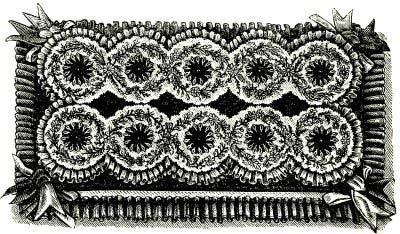
GLOVE CASE.
The holiday season is approaching, and little girls, who have generally more time than money, are employing their leisure moments in making pretty gifts for their papas and mammas, and brothers and sisters, which will give double pleasure as being the work of their own hands. Here is a pretty holiday gift, which our young friends can readily make with the help of the following description: Cut of Bordeaux velvet one piece eleven inches and three-quarters long and six inches wide for the outside, and cut three pieces of white satin of the same size for the lining. Apply embroidery worked on white cloth to the velvet. Having transferred the design to the material, which is pinked on the edges and inside of the figures, work the flowers in chain stitch with coral red silk in several shades, the stamens in knotted stitch and point Russe with yellow silk, and the spray in herring-bone stitch with olive silk in several shades. For the buds in knotted stitch use pink silk. Having bordered the application with olive-colored satin ribbon half an inch wide laid in box pleats, chain-stitch it on the foundation along the inner edges with gold thread. Underlay the velvet with wadding, and line it with satin; join the two pieces of satin designed for the bottom over wadding, and edge the bottom with a ruffle of Bordeaux satin ribbon seven-eighths of an inch wide. The case is joined with narrow white satin ribbon. Bows of olive and Bordeaux satin ribbon trim the case as shown by the illustration. A full-sized design of the embroidery was given on page 120 of Harper's Bazar, No. 8, Vol. XII. It is a good plan to perfume the wadding with sandal-wood, violet, or some of the many fragrant powders sold by druggists for this purpose. This pretty glove case can be varied by making it of plain silk or velvet, and trimming it in any style our young readers may fancy.
THE STORY OF A PARROT
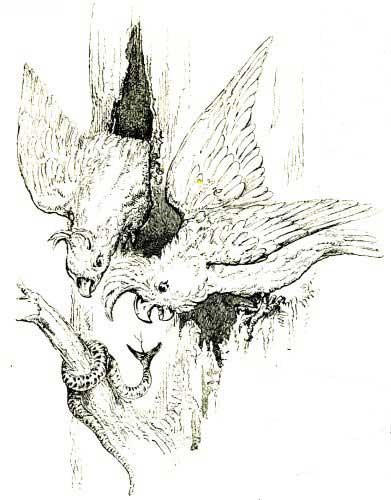
PAPA FIGHTS THE SERPENT.
A baby parrot who has just burst forth from his shell is not pretty to look at; indeed, I dare say you would have thought me exceedingly ugly. Like my brother and sister, I had a big bald head and a tremendous beak, while my wrinkled body was very small. I seemed to be all head, beak, and claws. Yet I remember perfectly well hearing our parents say to the many friends who came flying from all parts to offer them congratulations that we were the three most beautiful children ever born. I believe parents always think their children beautiful, and of course no one is ever so impolite as to contradict them.
We were very hungry babies, and poor papa had very hard work to bring home enough food to fill our three big beaks, which we kept wide open from morning till night. Mamma was very particular that our food should be of the most delicate kind, and papa often had to make long journeys through the forest to gather seeds and berries. He was a very kind papa, and if, as sometimes happened, he complained that his wings ached from flying so much, and that we made so much noise he could not sleep, mamma had only to call his attention to our rapid growth, and the beauty of our soft gray feathers, to put him at once in the best of humor. "They are magnificent children," he would say at such times, "and when they grow up I shall do as well by them as my father has done by me." Little did he think in those happy days that I, his eldest son, would soon be lost to him forever.
Our life was indeed peaceful, although we were subject at times to some anxiety from the attacks of certain wicked creatures which haunted the shores of our beautiful river. I remember, as if it had taken place yesterday, what happened one beautiful morning while papa had gone out to find our breakfast. Mamma had nestled down with us, and had soothed us into taking a little nap, when we were all startled by loud, shrill cries. Mamma recognized papa's voice at once. She was naturally very brave, and I think, to protect her children, she would have flown in the face of a lion. She now rushed to the door of our nest, where she stood, her feathers bristling, ready to give fight to whatever might try to enter. As she filled the whole doorway with her spread wings, we could not peep out to see what was the danger, although we stood on tiptoe and tried with all our strength to push our heads through her feathers. She gave us some smart taps with her claw, and ordered us back to the interior of the nest; and when she at length told us in a frightened whisper that papa was fighting with a ferocious serpent, we huddled together as close as we could in the very bottom of our hole. We knew that serpents murdered young parrots and ate them, for only the day before we had heard a neighbor telling mamma that one of these monsters had eaten six little parrots, children of a dear friend of hers, for his breakfast. Although mamma had said, after she went away, that she was only a gossip, and said such things to frighten us, now we were sure it was the truth, and we expected to see the serpent's head thrust into our nest, his mouth open to devour us. My brother and sister were half dead with fright. I tried to cheer them, assuring them that papa was strong enough to drive away a whole army of monsters, and when mamma suddenly flew away from the door, I crept up cautiously and peeped out. What was my relief to see papa flying rapidly toward the river, with an enormous serpent hanging dead in his claws! I screamed the good news to my brother and sister, but they refused to be comforted. In vain I assured them that the danger was over, that the serpent was conquered—was dead, in fact;—and that papa had thrown the loathsome body into the river, that we might not be frightened at the horrible sight. My brother and sister continued crying and trembling until papa and mamma returned.
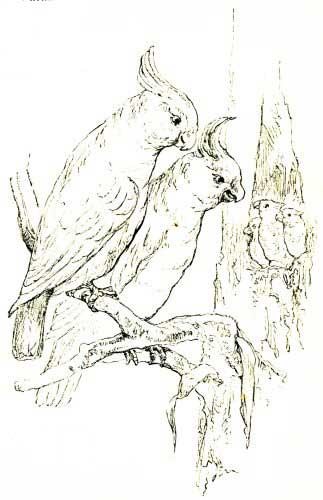
"MY DARLINGS ARE SAVED."
When at last we heard their joyful cries as they approached the nest, all three of us crept up to the doorway to welcome them. I shall never forget the tenderness with which they regarded us. Papa, who was still trembling with excitement, kissed us gently, while my poor mamma exclaimed, "Saved! my darlings are saved!" and her eyes shone with pride at the courage of her husband.
My feathers grew so rapidly that papa, who was very proud of me, I being much larger than my brother, would often say, "Bravo, my boy! You will soon be strong enough to go out with me into the forest."
In our first attempts to fly we were guided by mamma, who assisted us to hop about on the branches near our nest. After several of these short trials of strength papa took my brother and myself to visit our grandparents, who lived in a noble tree not far away. Never shall I forget my joy and pride when I first spread my wings and flew through the air at papa's side.
We had already made several short excursions, when one day—the most sorrowful day of my life—a boat, which we had been watching anxiously as it came up the river, stopped at the very roots of our tree. There were two men in it. As I peeped from the door I saw one man leave the boat and begin to climb up the trunk toward our nest. Mamma had told us only that morning that robbers had been seen on the opposite shore of our river, and that they were searching for young parrots, whom they tore away from their parents, and sent far away to a foreign country to be sold. "At the least danger," mamma had said to us, "fly. Man is a more formidable enemy than the serpent."
The man climbed nearer and nearer to our nest. Our parents were both away from home, and upon me, as the strongest and oldest, fell the responsibility of saving the family. There was not a moment to be lost. Aided by my brother, I threw my little sister, who was half dead with fright, headlong from the nest, and had the satisfaction to see her fly safely into the neighboring thicket. She used her little wings with strength and courage which would have been impossible for her to show except under the excitement of such terrible circumstances.
When my sister was saved, I hurried my brother after her, and he too escaped. Faithful to my duty, I remained the last in the nest, and at the instant when I spread my wings to fly away, the cruel hand of the robber closed tight around me. At that dreadful moment I fainted, and I remember nothing more until I found myself in a large cage with a number of other parrots, prisoners like myself.
Of the monotonous misery of the long sea-voyage that followed I can not even now endure to think. More than half my companions perished; and when at last we reached this great city, which I hear men call New York, I myself was nearly dead from confinement and sea-sickness.
[to be continued.]1
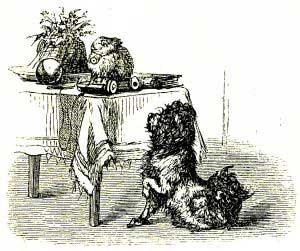
2
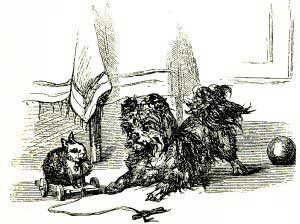
3

4
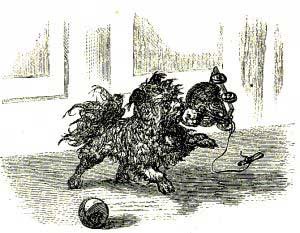
5
